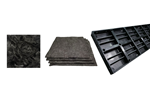Thermolysis, BASF Taiwan present low-emission rCF/TPU materials development
At a Taipei event focused on CO2 emissions reduction, design flexibility and zero-waste solutions, partners promoted recycled carbon fiber (rCF) and polyurethane composite technologies.
Recycled carbon fiber (rCF) nonwoven fabrics jointly developed by BASF and Thermolysis. Source (All Images) | Thermolysis Co. Ltd.
Thermolysis Co. Ltd. (Taichung City, Taiwan) announces its collaboration with chemicals company BASF Taiwan (Taipei) jointly advancing the development of recycled carbon fiber-reinforced thermoplastic polyurethane (rCF/TPU) composite materials. Thermolysis highlighted some of these developments in the “#ourplasticsjourney@Taipei event” hosted by BASF Taiwan on Oct. 17.
The event focused on key topics such as reducing CO2 emissions (CO2e reduction), enhancing design flexibility and achieving zero waste through sustainable material solutions. As a participant, Thermolysis showcased its materials and future development directions to major domestic brands, highlighting the potential of collaboration in various industries.
Peter Wu (left), Thermolysis chairman and Phil Chen (right), sales supervisor of BASF Performance Materials at the “#ourplasticsjourney@Taipei event” hosted by BASF Taiwan.
BASF Taiwan presented several rCF/TPU composite materials developed through the combination of its high-toughness TPU with Thermolysis’ rCF and processing technology. These materials included rCF/TPU nonwoven fabrics, injection pellets and sheets. During the event, BASF Taiwan noted that while traditional TPU materials are known for their versatility, the combination of these material innovations “significantly enhances the material’s strength without compromising its flexibility … offering diverse processing methods, meeting the needs of various product applications, with a significant advantage in the sports shoe industry.”
Moving forward, BASF and Thermolysis will continue to develop more sustainable and low-carbon solutions.
Related Content
-
The lessons behind OceanGate
Carbon fiber composites faced much criticism in the wake of the OceanGate submersible accident. CW’s publisher Jeff Sloan explains that it’s not that simple.
-
Sulapac introduces Sulapac Flow 1.7 to replace PLA, ABS and PP in FDM, FGF
Available as filament and granules for extrusion, new wood composite matches properties yet is compostable, eliminates microplastics and reduces carbon footprint.
-
Infinite Composites: Type V tanks for space, hydrogen, automotive and more
After a decade of proving its linerless, weight-saving composite tanks with NASA and more than 30 aerospace companies, this CryoSphere pioneer is scaling for growth in commercial space and sustainable transportation on Earth.















